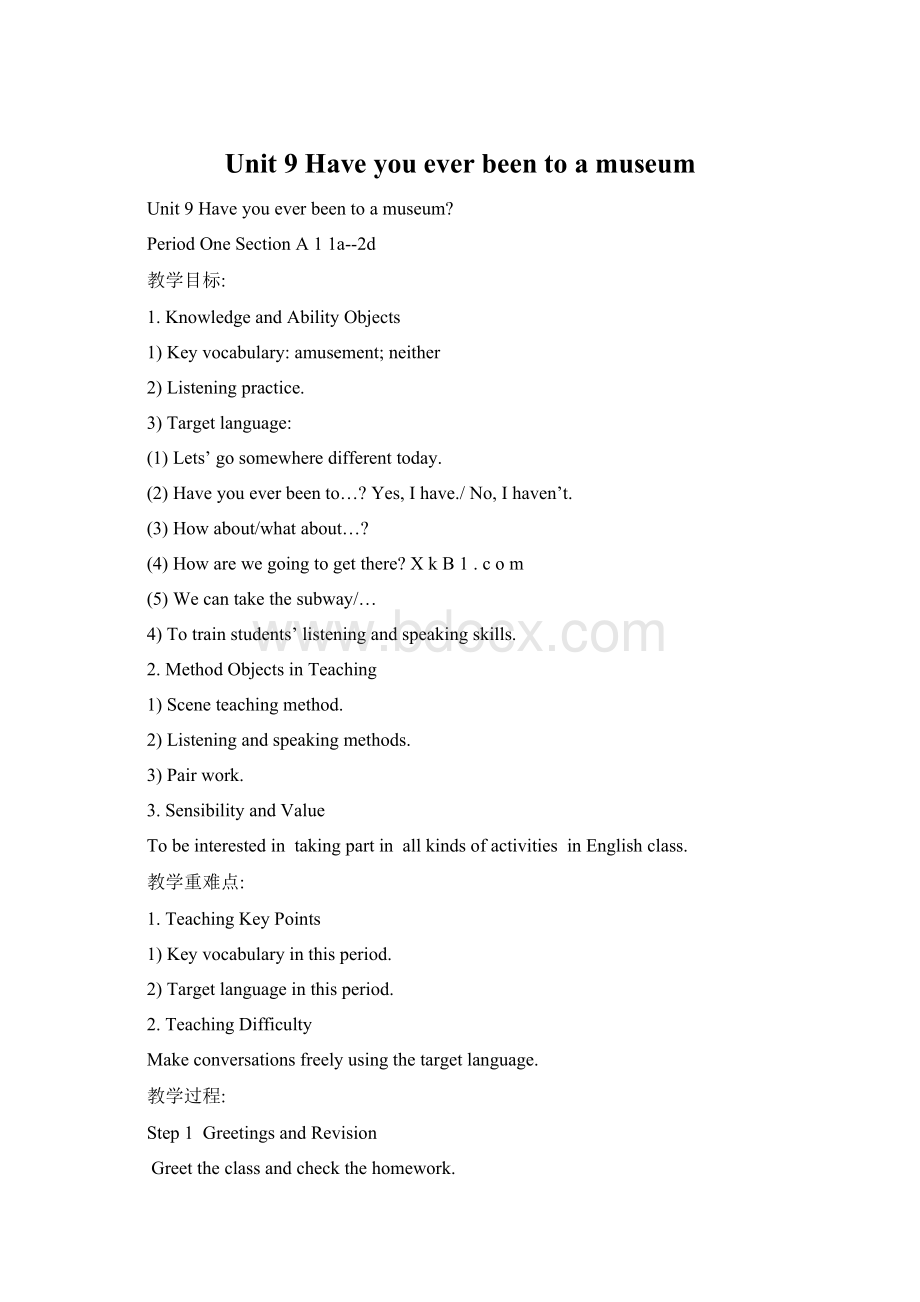Unit 9 Have you ever been to a museum.docx
《Unit 9 Have you ever been to a museum.docx》由会员分享,可在线阅读,更多相关《Unit 9 Have you ever been to a museum.docx(15页珍藏版)》请在冰豆网上搜索。

Unit9Haveyoueverbeentoamuseum
Unit9Haveyoueverbeentoamuseum?
PeriodOneSectionA11a--2d
教学目标:
1.KnowledgeandAbilityObjects
1)Keyvocabulary:
amusement;neither
2)Listeningpractice.
3)Targetlanguage:
(1)Lets’gosomewheredifferenttoday.
(2)Haveyoueverbeento…?
Yes,Ihave./No,Ihaven’t.
(3)Howabout/whatabout…?
(4)Howarewegoingtogetthere?
XkB1.com
(5)Wecantakethesubway/…
4)Totrainstudents’listeningandspeakingskills.
2.MethodObjectsinTeaching
1)Sceneteachingmethod.
2)Listeningandspeakingmethods.
3)Pairwork.
3.SensibilityandValue
TobeinterestedintakingpartinallkindsofactivitiesinEnglishclass.
教学重难点:
1.TeachingKeyPoints
1)Keyvocabularyinthisperiod.
2)Targetlanguageinthisperiod.
2.TeachingDifficulty
Makeconversationsfreelyusingthetargetlanguage.
教学过程:
Step1GreetingsandRevision
Greettheclassandcheckthehomework.
Step2Lead-in
1.Guesstheplacesofthepictures;theyaretheBritishMuseum,spacemuseum,historymuseum,waterpark,zoo,amusementparkwhileleadinsentencepatterns:
“Haveyoueverbeento…?
”
2.Speaking
Getstudentstoworkinpairstopracticetheconversation:
“Haveyoueverbeento…”“Yes,Ihave”/Not,Ihaven’t.
Step3Pre-listening
1.SectionA1a
T:
OK.NowopenyourbooksonPage65.InPart1a,6placesaregiven.Pleasereadthenamesoftheseplaces.(Teacherwritesthenamesontheblackboard.)Whichoftheseplaceswouldyouliketovisit?
Rankthemfrom1to5.
S4:
Amusementpark______,waterpark______,zoo______aquarium______spacemuseum______.
S5:
Spacemuseum______,aquarium______,zoo______,waterpark______,amusementpark______
S6:
…
2.Talkaboutthepicture
Step4Listening
1.Listenandchoosethebestanswer.Thefirstandthesecondquestionaimtolisteningtotime,andthethirdoneaimstolistenfortherelationship.Thisactivitytrainsstudents’listeningabilityforlisteningforspecificrelationship.
1)WhendidSarahvisittheNationalScienceMuseum?
A.TodayB.YesterdayC.Lastyear
2)WhendidClaudiavisitthenaturemuseum?
A.lastyearB.lastsummerC.Lastschooltrip
3)Whatmaytherelationshipbebetweenthetwospeakers?
A.FriendsB.TeacherandstudentC.Motherandkid.
Answer:
CCA
Step5Speaking
Askandanswerinpairs:
A:
let’sgosomewheredifferenttoday.B:
OK.Wheredoyouwanttogo?
A:
Haveyoueverbeentothespacemuseum?
B:
No,Ihaven’t.Howaboutyou?
A:
…
Step6Listening2a2b
1.Listenandcircletheplacesthatyouhear.
2.ListenagainandcircleTfortrueorFforfalse.
Answer:
TFTTFTFTT
Step7Languagepoints
1.Ilearnedabouttheinventionsthatledtocolormovies,too.我还了解了一些发明,它们成就了彩色电影。
此处learn是“了解;获知;得知”的意思,由介词about或of引入所获知的具体内容。
例如:
Thechildrenwereallshockedtolearnofthedeathoftheirheadmaster.
得知校长去世,孩子们都十分震惊。
Ionlylearnedabouttheaccidentlater.我只是后来才得知了事故的情况。
2.I’veneverbeencamping.我从未野营过。
此句为现在完成进行时。
这一时态的结构为“havebeen+现在分词”,表示从过去某一时刻延续至今的动作。
在本句中,说话人使用这一时态来强调自己至今从未有过野营的经历,欠缺这方面的经验。
又如:
He’sbeenwatchingTVallafternoon.他一下午都在看电视。
We’vebeenlivinglikethiseversincethebirthofmylittlebrother.自打我小弟弟出生,我们就一直这样生活。
Exercise
1.我去过北京两次。
I_____________________________Beijingtwice.
2.大声读书是一种学习英语的好方法。
Readingaloud_____________________________tolearnEnglish.
3.昨天他没有去那,我也没去。
Hedidn’tgothereyesterday.______________.
4.我了解了一些电影的知识。
I__________________someinformationaboutmovie.
5.他的粗心导致了这次失败。
Hiscarelessness____________________thisfailure.
选用have,has填空:
1.I_______toldhimthenews.2.She________comebackfromschool.3.You________wonthegame.
按要求改写下列各句:
4.Theyhaveboughtacomputer.(改成否定句)___________________________________________________
5.Hehaslosthisbook.(先改成一般疑问句,再作肯定与否定回答)
_________________________________________________________________________________________
Step8Homework
1.Practicethedialogueandrememberthelanguagepoints.
2.Previewthenextlesson.
PeriodTwoSectionA23a--3c
教学目标:
I.KnowledgeandAbilityObjects
1.Keyvocabulary:
unbelievable,progress,rapid,unusual,toilet,encourage,social,peaceful,performance,perfect,itself,collect
2.Targetlanguage:
1)Iwonderhowmuchmorecomputerwillbeabletodointhefuture
2)Watchingthempreparetheteawiththebeautifulteasetsisjustasenjoyableasdrinkingtheteaitself
3.Totrainstudents’readingability
4.Togetstudentsknowsomeknowledgeaboutmanykindsofmuseums.
II.MethodObjectsinTeaching
1)Skimmingfordetails.
2)Readingforcomprehension.
3)Communicativeapproach.
III.SensibilityandValue
Toraisestudents’interestoflearningEnglish.
教学重难点:
I.TeachingKeyPoints
1.Keyvocabulary:
unbelievable,progress,rapid,unusual,toilet,encourage,social,peaceful,performance,perfect,itself,collect
2.Targetlanguage:
1)Iwonderhowmuchmorecomputerwillbeabletodointhefuture
2)Watchingthempreparetheteawiththebeautifulteasetsisjustasenjoyableasdrinkingtheteaitself
II.TeachingDifficulties
1)Howtoimprovereadingskill.
2)Tounderstandthepassageandtheculture.
教学过程:
Step1GreetingsandRevision
Lookatthepicturesandmakeconversation:
A:
Haveyoueverbeento…?
B:
Yes,Ihave./No,Ihaven’t.
Step2Pre-reading
1.Brainstorm:
thinkofthekindsofmuseumsthatyoucanname.
2.Watchavideo.AvideoabouttheInternationalMuseumofToilets
3.Talkaboutthevideo.
Step3Fastreading
Matchthewordswithitsmeaningandlearnsomenewwords.
TrueorFalse
()1.AmericanComputerMuseumonlyhasinformationaboutdifferentcomputersthere.
()2.Kenthinkscomputerswilldomoreworkinthefuture.
()3.InternationalMuseumofToiletsisaveryunusualmuseum.
()4.Indiahasthemostadvancedtoilet.
()5.Linlindidn’tknowwhyhergrandpaloveddrinkingandcollectingteaset.
Step4Detailedreading
Readthepassageagainandanswerthequestions.
1.Whichthreemuseumsdothestudentstalkabout?
2.WhatdoesKensayabouttheAmericanComputerMuseum?
3.WhatcanwelearnattheInternationalMuseumofToilets?
4.WhyistheHangzhouNationalTeaMuseumaniceplacetoenjoytea?
5.Whatdoyouthinkisthemostinterestingthingabouteachmuseum?
Step5Explanation
1.ThemostinterestingmuseumI’vebeentoistheAmericanComputerMuseum.
多音节词和部分双音节形容词最高级加most构成,前面加the。
如:
themostbeautifulgirl
2.Theoldcomputersweremuchbigger.
much可修饰形容词比较级,表示……得多。
如:
muchricher
alittle,even,abit也可以修饰形容词比较级。
3.Iwonderhowmuchmorecomputerwillbeabletodointhefuture.
不知道将来电脑还能够做些什么事情呢。
1)wonder表示“(对某事)感到疑惑;想要知道;想弄明白;琢磨”,后面常接由what,how,who或者
if/whether引导的宾语从句。
e.g.Iwonderhowthey’regettingon.我想知道他们现在过得怎样。
Ijustwonderifthey’vearrivedsafely.我就想知道他们是否安全抵达了。
2)此句从句部分的原始结构是:
Howmuchmorewillcomputersbeabletodointhefuture?
是对陈述句Computerswillbeabletodo(much)moreinthefuture.(电脑将来能够做更多的事情。
)的提问。
由于充当了宾语从句,疑问结构改成了陈述结构:
howmuchmorecomputerswillbeabletodointhefuture,即:
将助动词还原到陈述句的位置。
e.g.Idon’tknowwhenhewillcome.我不知道他什么时候来。
Idon’tknowwherehelives.我不知道他住在哪里。
4.Italsoencouragesgovernmentsandsocialgroupstothinkaboutwaysto…
encouragesb.todosth.鼓励某人做某事
e.g.Myfatherencouragedmetotakepartinthesportsmeeting.父亲鼓励我参加运动会。
5.Watchingtheteapreparationisjustasenjoyableasdrinkingtheteaitself.
看沏茶的过程和饮茶本身一样令人愉快。
-able是一个典型的形容词后缀,可加在动词之后,表示“可…..的;能够……的”。
此处enjoyable(能使人快乐的;令人愉快的)便是一例,再如:
drinkable(可饮用的),washable(可洗的),readable(可读的),usable(可用的;可使用的)等等。
Step6Homework
1.Rememberthewordsandexpressions.
2.Finishtheexercisesintheworkbook.
PeriodThreeSectionA3Grammarfocus-–4c
教学目标:
1.KnowledgeandAbilityObjects
1)Targetlanguage:
Haveyoueverbeentoasciencemuseum?
Yes,I’vebeentoasciencemuseum./
No,I’veneverbeentoasciencemuseum.
Haveyouevervisitedthespacemuseum?
Yes,Ihave.Iwenttherelastyear./
No,Ihaven’t.
I’vebeentotheartmuseummanytimes.
Me,too.AndI’vealsovisitedthenaturemuseum.
2.MethodObjectsinTeaching
1)Explanationmethod.
2)Exercisemethods.
教学重难点:
1.TeachingKeyPoints
1.Thepresentperfecttense.
2.Howtousethepresentperfecttense.
2.TeachingDifficulties
Tounderstandandusethepresentperfecttense.
教学过程:
Step1GreetingsandRevision
Greettheclassasusualandcheckthehomework.
AskstudentstoreadthesentencesofGrammarfocusaloud.
Step2LearnthePresentPerfectTense
1.用法
肯定式
否定式
I/You/We/Theyhavefinishedthework.
He/She/Ithasfinishedthework.
I/You/We/Theyhavenotfinishedthe
work.
He/She/Ithasnotfinishedthework.
构成:
have(助动词)+p.p
has(第三人称单数助动词)+p.p
疑问式
回答
HaveI/youfinishedthework?
Hashe/shefinishedthework?
Yes,you/Ihave.
No,you/Ihaven’t.
Yes,he/shehas.
No,he/shehasn’t.
havenot常缩略为haven’t,hasnot常缩略为hasn’t
现在完成时的用法
Haveyouhadyourlunchyet?
Yes,Ihave.Ihavejusthadit.(现在我不饿了)
表示过去发生或已经完成的动作对现在造成的影响或结果。
Ihaven’tseenherthesedays.
IhaveknownBobforthreeyears.
I’vebeenatthisschoolforovertwoyears.
Theyhavelivedheresince1982.
ShehastaughtussinceIcametothisschool.
某些动词的现在完成时可表示过去某一时间开始并一直持续到现在(包括现在)的动作或者状态,可以和表示延续的时间状语连用。
表示持续动作或状态的是延续性动词。
ever意为“曾经”,用于疑问句或否定句中,放在助动词与过去分词之间。
e.g.Have you ever been to Hong Kong?
你曾去过香港吗?
I haven’t ever spoken to her.我未曾和她说过话。
never意为“从来没有”常与before连用,多放在助动词与过去分词之间。
e.g.I have never travelled by plane before.我以前从来没有乘飞机旅行过。
2.havebeento&havegoneto区别
比较:
HehasbeentoBeijing.他曾去过北京。
(人已回来,可能在这儿)
HehasgonetoBeijing.他已经去北京